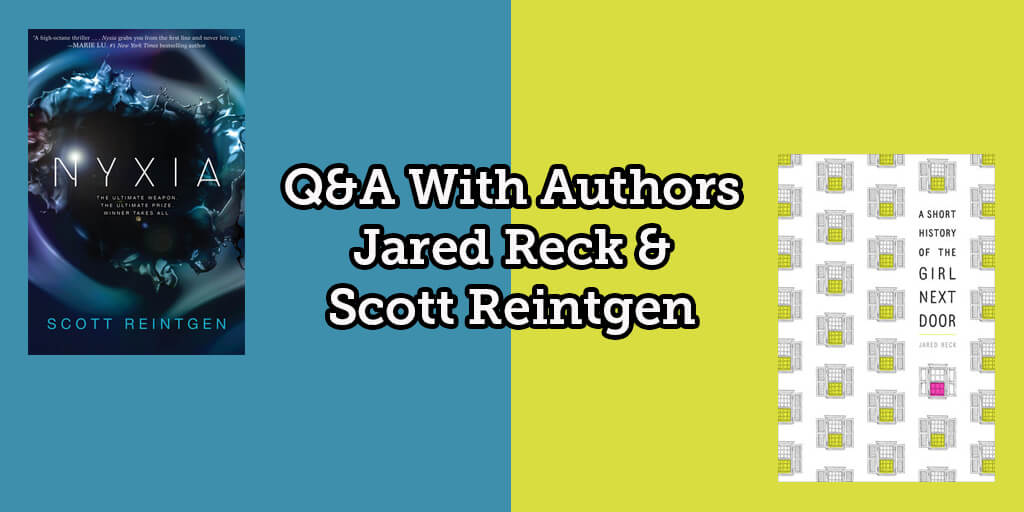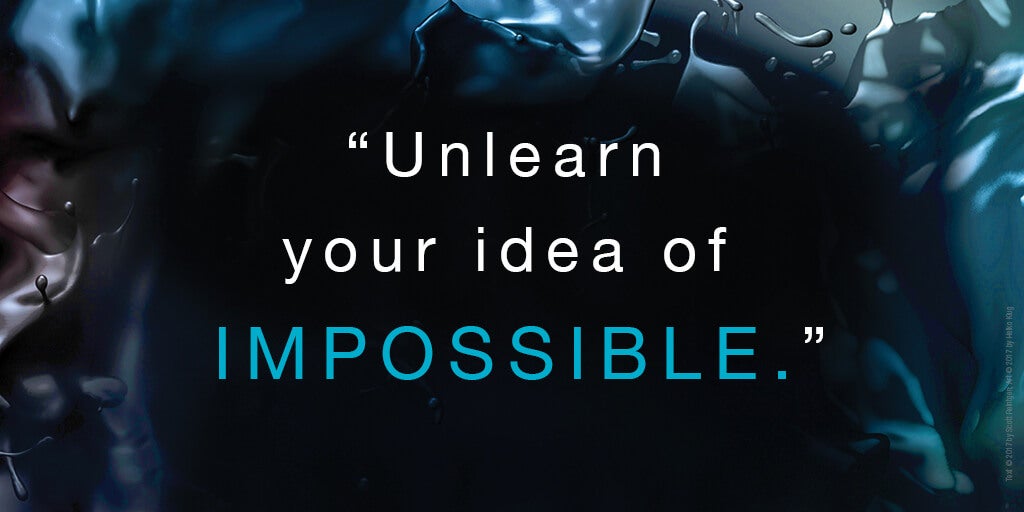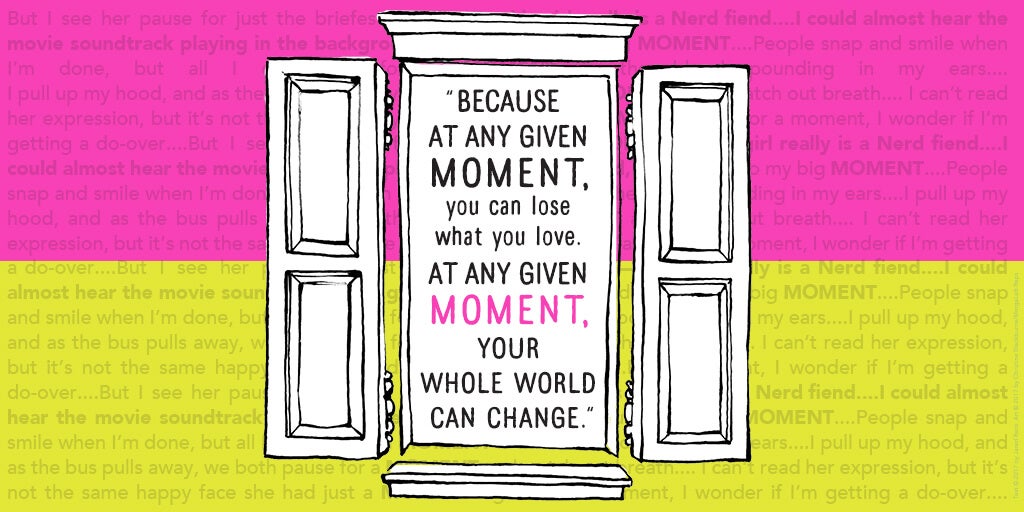We couldn’t pick just one book to spotlight this month, so we’re giving you an exclusive look at TWO awesome books: Nyxia by Scott Reintgen, an intergalactic adventure story, and A Short History of the Girl Next Door by Jared Reck, a hilarious and heartbreaking contemporary romance.
They’re two very different books by two very awesome authors. We sat down with Jared and Scott to learn about their writing processes.

1. Where do you get your writing inspiration?
SCOTT:
I try to draw on the world around us. My wife always jokes that I have a weird brain. One time, we were hiking in the mountains and we had been quiet for a while. She asked what I was thinking about, and I realized I’d been trying to figure out how we would escape if an army was chasing us through the mountain passes. To which she replied, “Of course that’s what you’re thinking about.” So take the simple and the everyday and do your best to draw the magic out of it!
JARED:
A lot of my inspiration comes from teaching—not necessarily from observing my students, but from having to do a good job for them, you know? I run a writing workshop, so I’m always writing in front of them as a model for different lessons. For instance, if I’m modeling revision techniques, I’ll use a chapter from the novel I’m working on. So maybe it’s not inspiration so much as “ninety eighth-graders are going to see this tomorrow, so it had better not suck.” It’s a healthy kind of pressure, I think.
Likewise, I’m usually trying to make my students laugh, and I love writing about the same things that I love talking about with them—the kinds of dumb games we played in our neighborhoods as kids, painfully embarrassing moments, the stuffed animals we carried everywhere when we were little, early relationships. Ordinary stuff that makes us cringe and laugh and connect with one another. Sometimes I feel like my writing is about as far from high-concept as you can get, so it should make people feel something at least.
2. Do you have any unique writing habits? What is your writing process?
JARED:
I start all of my stories by first developing a main character with a simple character questionnaire I use with my students. It’s about twenty questions, and the trick is to pretend you’re talking to your character and writing down everything he or she says. I’ll usually write twenty to thirty pages of responses before I even start writing the novel (though much of it will show up in the finished work).
I also prefer to write longhand, in cheap composition books with cheap ballpoint pens. I need to be able to make a mess of the page, with arrows and asterisks and bulleted lists and notes to myself—I’ve got Post-it notes all over the place. Then, after I’ve written a few scenes or chapters, I go back and type it out, revising as I go. Then back into the composition books again. It’s messy and it’s slow, but that’s how my brain works. And by the time I type to the very end, it’s a pretty clean finished product.
I wish I were cool enough to say I had a specific, preferred model of pen that I write with exclusively. But I’m not that cool. Mostly, I like blue.
SCOTT:
I don’t know that it’s unique, but I do start each writing day by going back to the work I did the day before. Let’s say I wrote two thousand words, I’ll go back and revise my way through that writing as a warm-up exercise. It helps me to build a rhythm, reorient myself to the characters’ voices, and get things humming. It also has the happy side effect of making my writing from the day before a little cleaner.
3. What is your all-time favorite book, or who is your favorite author?
SCOTT:
You realize this question is rude, don’t you?! I think the book that stands out as the best I’ve ever read—meaning the first read was the most enjoyable experience—is A Game of Thrones by George R. R. Martin. I know the books have gotten hyped up because of the HBO series, but that first book is a master class in writing. Characters with great motivations, perfect use of mood, conflicts that amplify and come from every direction. It’s brilliant. I think Harry Potter and the Half-Blood Prince comes in just behind it.
JARED:
My two writing heroes are Chris Crutcher and A. S. King. And if I had to choose one book as my all-time favorite, it would be Everybody Sees the Ants by A. S. King.

4. What is the last book you read?
SCOTT:
The last book I read was Fool’s Assassin by Robin Hobb. I’ve always loved her books, but quickly went and grabbed the Fitz and the Fool trilogy after meeting her at San Diego Comic-Con. It’s such a great read.
JARED:
I just finished an advance reader’s copy of Anna Priemaza’s debut, Kat and Meg Conquer the World, which I loved—such a perfect, honest, moving story of two unlikely friends. Kat and Meg hits shelves on November 7.
Prior to that, I got my hands on Nyxia, and, well, yeah. I was blown away. If Ender’s Game and The Hunger Games had a baby, and then that baby grew up to be way more badass than you even expected, that would be Nyxia.
5. What is your advice to aspiring writers?
JARED:
First, my all-time favorite writing quote is from Stephen King’s On Writing—I use this on day one of my class every year: “If you want to be a writer, you must do two things above all others: read a lot and write a lot. There’s no way around these two things that I’m aware of, no shortcut.”
And second, it’s okay to fake it. Seriously. I just finished writing my second novel, and I still feel like I’m faking it—like I shouldn’t call myself a writer. But even if you feel that way—and I bet most of us feel that way—go ahead and pretend like you’re a real writer anyway: join an organization like SCBWI, take a class or a workshop, find a writing friend or two, do your research, keep reading and writing, and pretend that you’re already so successful that you can write about whatever makes you truly happy. (I wrote about Nerds, basketball, corked Wiffle ball bats, and almost inappropriately good gravy.)
SCOTT:
Just write. Log the time. Put in the hours. Mastery of craft only comes with practice. There’s this poem by Seamus Heaney called “Digging” that I’ve always loved. In that poem, Heaney admires his hard-working father and grandfather, both of whom are farmers. At the end of the poem, Heaney concludes that he can’t follow in their footsteps—he is a poet at heart—but he has different tools with which he can dig. I think about that every time I sit down to write. I’m digging, finding out new strategies, and trying to get better each time.
6. What is your favorite show to binge-watch?
SCOTT:
Right now my wife and I are knee-deep in Grey’s Anatomy. Of course, I’m watching and loving Game of Thrones. And I think it’s a tie between Friday Night Lights, Parks and Rec, and Lost for shows we’ve binge-watched the fastest.
JARED:
I honestly watch almost no TV, but the last ones I loved and binged with my wife and oldest daughter are The Office and Parks and Rec.

7. What is a fun fact about you that your readers might not know?
JARED:
Besides being a teacher and a writer, I’m also an elected school board director in my daughters’ school district, and I serve on our town’s recreation board. It’s so important to be engaged and to get involved. In local politics, you can have such an immediate, positive impact on your community.
SCOTT:
My wife and I just had a baby boy! Henry is this perfect little man, and I’m too excited about him being here to think of anything else about me that’s all that interesting.
8. What is the one thing you want readers to know about Nyxia?
SCOTT:
I want them to know I wrote this for my students. Every time a reader says they fell in love with the characters—or really enjoyed Emmett’s perspective as the narrator—I like to think that they’re falling for the stories and dreams of the diverse students I’ve taught.
9. What is the one thing you want readers to know about A Short History of the Girl Next Door?
JARED:
I love the idea in writing that in the specific lies the universal—that there’s beauty and emotion and connection in ordinary, seemingly insignificant moments. In the book, that comes across as “any given moment might be perfect.” Trick-or-treat traditions, favorite candies, neighborhood home run derbies, and Candyland with little brothers. Playing in the snow as kids. That stuff matters, you know?

